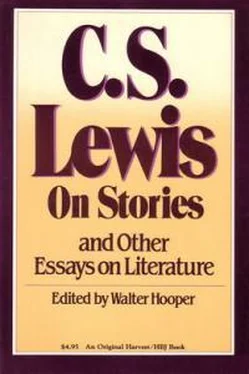I have sometimes wondered whether the 'excitement' may not be an element actually hostile to the deeper imagination. In inferior romances, such as the American magazines of 'scientifiction' supply, we often come across a really suggestive idea. But the author has no expedient for keeping the story on the move except that of putting his hero into violent danger. In the hurry and scurry of his escapes the poetry of the basic idea is lost. In a much milder degree I think this has happened to Wells himself in the War of the Worlds . What really matters in this story is the idea of being attacked by something utterly 'outside'. As in Piers Plowman destruction has come upon us 'from the planets'. If the Martian invaders are merely dangerous—if we once become mainly concerned with the fact that they can kill us—why, then, a burglar or a bacillus can do as much. The real nerve of the romance is laid bare when the hero first goes to look at the newly fallen projectile on Horsell Common. 'The yellowish–white metal that gleamed in the crack between the lid and the cylinder had an unfamiliar hue. Extra–terrestrial had no meaning for most of the onlookers.' But extra–terrestrial is the key word of the whole story. And in the later horrors, excellently as they are done, we lose the feeling of it. Similarly in the Poet Laureate's Sard Harker it is the journey across the Sierras that really matters. That the man who has heard that noise in the cañon—'He could not think what it was. It was not sorrowful nor joyful nor terrible. It was great and strange. It was like the rock speaking'—that this man should be later in danger of mere murder is almost an impertinence.
It is here that Homer shows his supreme excellence. The landing on Circe's island, the sight of the smoke going up from amidst those unexplored woods, the god meeting us ('the messenger, the slayer of Argus')—what an anti–climax if all these had been the prelude only to some ordinary risk of life and limb! But the peril that lurks here, the silent, painless, unendurable change into brutality, is worthy of the setting. Mr. de la Mare too has surmounted the difficulty. The threat launched in the opening paragraphs of his best stories is seldom fulfilled in any identifiable event: still less is it dissipated. Our fears are never, in one sense, realized: yet we lay down the story feeling that they, and far more, were justified. But perhaps the most remarkable achievement in this kind is that of Mr. David Lindsay's Voyage to Arcturus . The experienced reader, noting the threats and promises of the opening chapter, even while he gratefully enjoys them, feels sure that they cannot be carried out. He reflects that in stories of this kind the first chapter is nearly always the best and reconciles himself to disappointment; Tormance, when we reach it, he forbodes, will be less interesting than Tormance seen from the Earth. But never will he have been more mistaken. Unaided by any special skill or even any sound taste in language, the author leads us up a stair of unpredictables. In each chapter we think we have found his final position: each time we are utterly mistaken. He builds whole worlds of imagery and passion, any one of which would have served another writer for a whole book, only to pull each of them to pieces and pour scorn on it. The physical dangers, which are plentiful, here count for nothing: it is we ourselves and the author who walk through a world of spiritual dangers which makes them seem trivial. There is no recipe for writing of this kind. But part of the secret is that the author (like Kafka) is recording a lived dialectic. His Tormance is a region of the spirit. He is the first writer to discover what 'other planets' are really good for in fiction. No merely physical strangeness or merely spatial distance will realize that idea of otherness which is what we are always trying to grasp in a story about voyaging through space: you must go into another dimension. To construct plausible and moving 'other worlds' you must draw on the only real 'other world' we know, that of the spirit.
Notice here the corollary. If some fatal progress of applied science ever enables us in fact to reach the Moon, that real journey will not at all satisfy the impulse which we now seek to gratify by writing such stories. The real Moon, if you could reach it and survive, would in a deep and deadly sense be just like anywhere else. You would find cold, hunger, hardship, and danger; and after the first few hours they would be simply cold, hunger, hardship, and danger as you might have met them on Earth. And death would be simply death among those bleached craters as it is simply death in a nursing home at Sheffield. No man would find an abiding strangeness on the Moon unless he were the sort of man who could find it in his own back garden. 'He who would bring home the wealth of the Indies must carry the wealth of the Indies with him.'
Good stories often introduce the marvellous or supernatural, and nothing about Story has been so often misunderstood as this. Thus, for example, Dr. Johnson, if I remember rightly, thought that children liked stories of the marvellous because they were too ignorant to know that they were impossible. But children do not always like them, nor are those who like them always children; and to enjoy reading about fairies—much more about giants and dragons—it is not necessary to believe in them. Belief is at best irrelevant; it may be a positive disadvantage. Nor are the marvels in good Story ever mere arbitrary fictions stuck on to make the narrative more sensational. I happened to remark to a man who was sitting beside me at dinner the other night that I was reading Grimm in German of an evening but never bothered to look up a word I didn't know, 'so that it is often great fun' (I added) 'guessing what it was that the old woman gave to the prince which he afterwards lost in the wood'. 'And specially difficult in a fairy–tale,' said he, 'where everything is arbitrary and therefore the object might be anything at all.' His error was profound. The logic of a fairy–tale is as strict as that of a realistic novel, though different.
Does anyone believe that Kenneth Grahame made an arbitrary choice when he gave his principal character the form of a toad, or that a stag, a pigeon, a lion would have done as well? The choice is based on the fact that the real toad's face has a grotesque resemblance to a certain kind of human face—a rather apoplectic face with a fatuous grin on it. This is, no doubt, an accident in the sense that all the lines which suggest the resemblance are really there for quite different biological reasons. The ludicrous quasi–human expression is therefore changeless: the toad cannot stop grinning because its 'grin' is not really a grin at all. Looking at the creature we thus see, isolated and fixed, an aspect of human vanity in its funniest and most pardonable form; following that hint Grahame creates Mr. Toad—an ultra–Jonsonian 'humour'. And we bring back the wealth of the Indies; we have henceforward more amusement in, and kindness towards, a certain kind of vanity in real life.
But why should the characters be disguised as animals at all? The disguise is very thin, so thin that Grahame makes Mr. Toad on one occasion 'comb the dry leaves out of his hair '. Yet it is quite indispensable. If you try to rewrite the book with all the characters humanized you are faced at the outset with a dilemma. Are they to be adults or children? You will find that they can be neither. They are like children in so far as they have no responsibilities, no struggle for existence, no domestic cares. Meals turn up; one does not even ask who cooked them. In Mr. Badger's kitchen 'plates on the dresser grinned at pots on the shelf'. Who kept them clean? Where were they bought? How were they delivered in the Wild Wood? Mole is very snug in his subterranean home, but what was he living on ? If he is a rentier where is the bank, what are his investments? The tables in his forecourt were 'marked with rings that hinted at beer mugs'. But where did he get the beer? In that way the life of all the characters is that of children for whom everything is provided and who take everything for granted. But in other ways it is the life of adults. They go where they like and do what they please, they arrange their own lives.
Читать дальше











